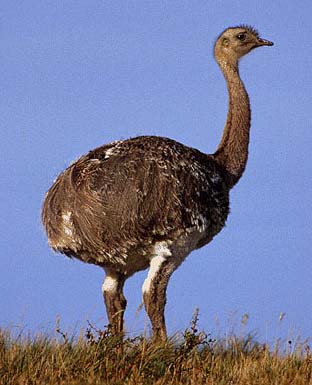Butchery Or Business?
Ostriches On Line



Ostriches are the world's largest birds. They grow between seven and nine feet tall and weigh between 230 - 350 lb. They all belong to a single species Struthio camelus. There are four existing sub-species, and a recently extinct sub-species, the Syrian ostrich. The Syrian bird was hunted to extinction - the last one perished in 1941.Ostriches are sensitive and inoffensive creatures. Their natural habitat is the plains of Africa. Ostriches can run at 40 mph and walk tens of miles a day in their natural home. They can live into their 70s.
In the West, they are farmed for profit. Humans raise them commercially and butcher them for their leather, flesh, and feathers. The birds are confined to pens; their eggs taken away; and the chicks killed at 12-14 months old.
Killing ostriches is a brutal business. It causes intense suffering to the victim. After the stress of transport, the ostrich is penned up in darkness with a hood over its head the whole night before slaughter. The next day, still hooded, it is taken to the slaughter pen. Its legs are hobbled 18 inches apart and the hood is soaked in water. An electric sheep-stunner is clamped across its head. The bird it then hoisted up and its throat cut.
Is causing suffering for financial profit morally justified? Are other sentient creatures merely objects to be exploited and killed? Ostriches On Line can be contacted with your views at www.ostrichesonline.com
The ALF FAQ
Ostrich hotlinks
Ostrich Close-Up
Animal Rights FAQ
The Taste of Depravity
The Vegan Society (UK)
The Vegetarian Society UK
The Post Darwinian Transition
The Slaughter of Animals for Food
"We recognise, I hope, our special responsibilities to the aged and infirm, towards the sick, the mentally subnormal and the physically handicapped. We say that such sentient creatures that are less able to care for themselves deserve our special care and support. The same argument applies to children - and we as adults claim we recognise special duties towards them. If this is so, then why do we not recognise our special duties towards individuals from less clever species?"
Richard Ryder